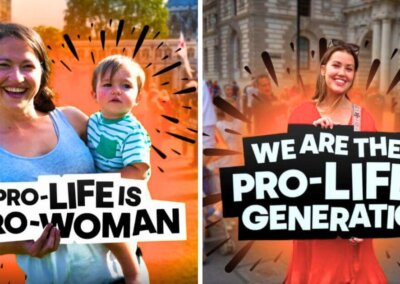The Archbishop of Canterbury has said that when his wife was pregnant with one of his daughters, it was “expected” they would want an abortion if she were found to have a disability.
Speaking about a motion on the dignity of disabled children at the General Synod, the Church of England’s legislative body, on Sunday, Justin Welby said that before his daughter was born, “there was some concern [she might have a disability] and a test was offered, but it was made very, very clear to my wife that if the test was taken and proved positive, it would be expected that we ask for a termination”.
“It was not a neutral process, because they said it’s expensive”.
The Archbishop added that his daughter was “exceptionally precious”.
“She’s precious because she’s wonderful, she’s kind, she is someone who gets cross and gets happy and gets sad. She’s not that severely disabled”.
Welby’s now 32-year-old daughter, Ellie, was born with dyspraxia, a condition affecting physical coordination.
The dignity of disabled children
The motion, which led the Archbishop to make his comments, was brought forward by the Ven Pete Spiers, an archdeacon from Liverpool, and was intended to ensure “that parents and mothers in particular have access to the information and practical support that is available to them when the possibility of abortion is being considered especially when the unborn child might be disabled”.
In particular, the motion, which passed unanimously, “[c]hallenges the common assumption that bringing a disabled child into the world is a tragedy to be avoided”.
The motion also called healthcare providers “to improve the support they give to the parents and families of children born with disabilities”.
Abortion statistics released by the Department of Health and Social Care on 23 May this year show the highest number of abortions ever recorded in England and Wales, with 252,122 taking place in 2022, an increase of 37,253 (17.34%) from 2021.
There were 3,124 disability-selective abortions in 2022,
256 of which took place at 24 weeks and over.
760 babies with Down’s syndrome were aborted in 2022,19 of which took place at 24 weeks and over, and there were 46 abortions where the baby had a cleft lip or cleft palate, an increase of 15% from 2021. 6 abortions where a baby had a cleft lip or cleft palate took place at 24 weeks and over.
Sadly, the figures for cleft lip and palate are likely to be higher than the Department of Health figures say; for example, a 2013 review by Eurocat showed 157 babies were aborted with cleft lip and palate in England and Wales between 2006 and 2010. However, the Department of Health and Social Care (DHSC) recorded only 14 such abortions.
Spokesperson for Right To Life UK, Catherine Robinson, said “While this sad case happened many years ago, the very fact that the Royal College of Obstetricians and Gynaecologists released guidelines emphasising the importance of a non-directive approach to prenatal screening for Down’s syndrome, Edwards’ syndrome and Patau’s syndrome, indicates that there remains a serious problem with negative attitudes towards disability and the presumption in favour of abortion”.
“The General Synod is absolutely right to emphasise the dignity of babies with disabilities who have equal dignity with every other human, born and unborn”.












